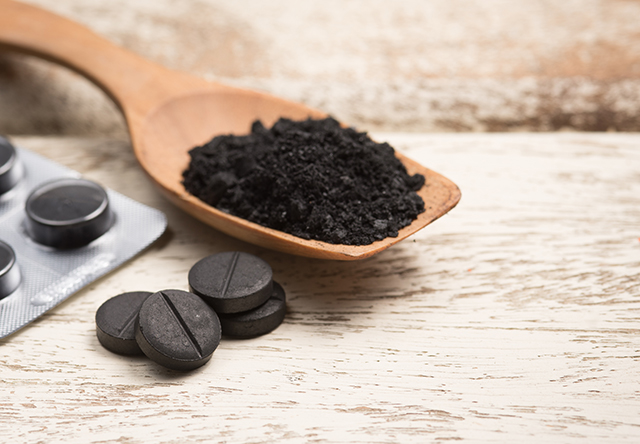
Advertisement
It seems like activated charcoal is everywhere these days. You can find the odorless black powder in all sorts of products, from toothpaste to supplements. It’s even in ice cream!
But perhaps the most popular use of activated charcoal is as a detoxifying agent. Proponents tout it as a potent detoxifier since it can trap toxins in the body and ferry them out.
Your liver and kidneys naturally get rid of those toxins. But they may have a hard time doing so if you often eat or drink unhealthy foods and beverages that fill your body with junk. Drinking water contaminated with heavy metals like lead and nickel can also raise your body’s toxin levels and strain your filtering organs.
Enter activated charcoal.
Detoxing with activated charcoal
So what exactly is activated charcoal? For starters, it’s different from the charcoal bricks used to grill food. It is a fine, odorless black powder composed of carbon-based compounds–sawdust, coconut shells or peat–that have been “activated.” This means they were heated at high temperatures to make them more porous.
This is done to increase the activated charcoal’s surface area. If the surface area is big, the charcoal will be able to trap more toxins and prevent their absorption into the body. The toxins exit your body through feces.
But take note that activated charcoal can only bind to certain substances. So exercise caution when purchasing activated charcoal products, as some may claim to support general detoxification of the body.
Listed below are substances that activated charcoal is NOT recommended for:
- Substances containing metal (e.g., iron, lithium)
- Substances made of hydrogen and carbon (e.g., gases like methane or propane)
- Substances that cause burns when touched or swallowed (e.g., gasoline, paint thinner)
- Alcohol (can adsorb to activated charcoal but not effectively enough)
- Electrolytes (e.g., magnesium, potassium, sodium)
- Very acidic or very alkaline substances
For the most part, existing studies on activated charcoal support its use for protecting against harmful organic vapors from paints and adhesives and removing heavy metals from contaminated drinking water.
There is also evidence to support the use of activated charcoal for removing excess phosphorus from the blood of people with chronic kidney disease. Normally, kidneys remove excess phosphorus in the blood to prevent health problems. In people with chronic kidney disease, their kidneys can’t remove excess phosphorus.
Activated charcoal can be taken in capsule, liquid or powder form. And since it is tasteless, it can be added to a non-acidic juice of your choice.
Activated charcoal is generally considered safe when taken by healthy adults for a short period of time. But the texture isn’t a big plus, and some even end up vomiting after consuming activated charcoal. In some cases, people may even inhale vomit into the lungs. This can lead to an infection called aspiration pneumonia.
Taking large or repeated doses of activated charcoal can also cause a blockage along your digestive tract. It can prevent your body from properly digesting food and absorbing nutrients as well. Constipation and diarrhea may also occur. So if you plan to use activated charcoal, consult a certified natural health practitioner.
Other uses for activated charcoal
Activated charcoal’s ability to trap toxins comes in handy for a variety of purposes. Check out how else you can use this product:
- For filtering water – Activated charcoal makes a great material for water filters because it is naturally effective at removing toxins and other organic impurities from the water without stripping it of salts and minerals.
- For whitening teeth – Scores of teeth-whitening products contain activated charcoal. Proponents say activated charcoal’s toxin-absorbing and antimicrobial properties may come in handy here, as the charcoal may help get rid of stains on teeth and neutralize oral cavity-causing bacteria.
- For treating reduced bile flow – There is some evidence that activated charcoal might treat reduced bile flow during late pregnancy, a liver disorder called cholestasis.
- For lowering your cholesterol – Activated charcoal helps reduce the absorption of bile acids in your liver, which results in increased cholesterol breakdown. Some studies of people with high cholesterol showed that taking four to 32 grams of activated charcoal helps lower total and “bad” cholesterol.
- For relieving digestive problems – Research shows that supplementing with activated charcoal can provide relief from intestinal gas, bloating and abdominal cramps. The activated charcoal can bind to excess intestinal gasses and ferry them out of your body.
Proponents of and existing studies on activated charcoal support its use for ridding your body of certain toxins that may cause health problems. Remember to take activated charcoal in moderation to avoid potential adverse effects or, better yet, consult a certified natural health practitioner beforehand.
Sources:
Advertisements







